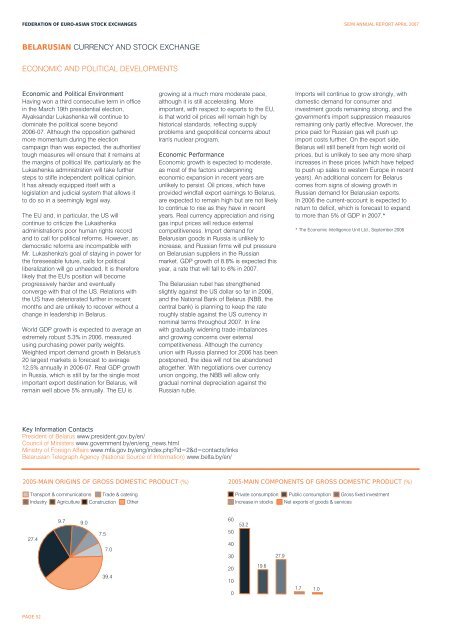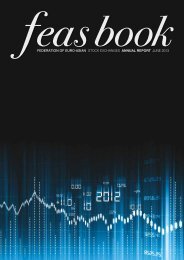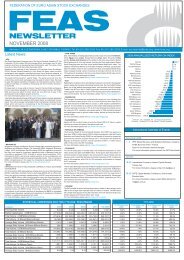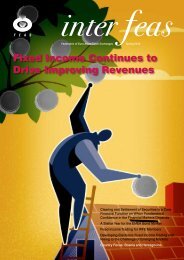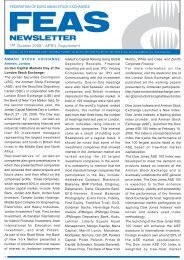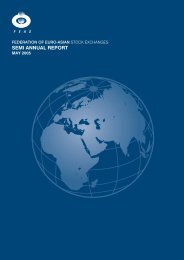Download - FEAS
Download - FEAS
Download - FEAS
Create successful ePaper yourself
Turn your PDF publications into a flip-book with our unique Google optimized e-Paper software.
FEDERATION OF EURO-ASIAN STOCK EXCHANGES SEMI ANNUAL REPORT APRIL 2007<br />
BELARUSIAN CURRENCY AND STOCK EXCHANGE<br />
ECONOMIC AND POLITICAL DEVELOPMENTS<br />
Economic and Political Environment<br />
Having won a third consecutive term in office<br />
in the March 19th presidential election,<br />
Alyaksandar Lukashenka will continue to<br />
dominate the political scene beyond<br />
2006-07. Although the opposition gathered<br />
more momentum during the election<br />
campaign than was expected, the authorities'<br />
tough measures will ensure that it remains at<br />
the margins of political life, particularly as the<br />
Lukashenka administration will take further<br />
steps to stifle independent political opinion.<br />
It has already equipped itself with a<br />
legislation and judicial system that allows it<br />
to do so in a seemingly legal way.<br />
The EU and, in particular, the US will<br />
continue to criticize the Lukashenka<br />
administration's poor human rights record<br />
and to call for political reforms. However, as<br />
democratic reforms are incompatible with<br />
Mr. Lukashenka's goal of staying in power for<br />
the foreseeable future, calls for political<br />
liberalization will go unheeded. It is therefore<br />
likely that the EU's position will become<br />
progressively harder and eventually<br />
converge with that of the US. Relations with<br />
the US have deteriorated further in recent<br />
months and are unlikely to recover without a<br />
change in leadership in Belarus.<br />
World GDP growth is expected to average an<br />
extremely robust 5.3% in 2006, measured<br />
using purchasing power parity weights.<br />
Weighted import demand growth in Belarus's<br />
20 largest markets is forecast to average<br />
12.5% annually in 2006-07. Real GDP growth<br />
in Russia, which is still by far the single most<br />
important export destination for Belarus, will<br />
remain well above 5% annually. The EU is<br />
growing at a much more moderate pace,<br />
although it is still accelerating. More<br />
important, with respect to exports to the EU,<br />
is that world oil prices will remain high by<br />
historical standards, reflecting supply<br />
problems and geopolitical concerns about<br />
Iran's nuclear program.<br />
Economic Performance<br />
Economic growth is expected to moderate,<br />
as most of the factors underpinning<br />
economic expansion in recent years are<br />
unlikely to persist. Oil prices, which have<br />
provided windfall export earnings to Belarus,<br />
are expected to remain high but are not likely<br />
to continue to rise as they have in recent<br />
years. Real currency appreciation and rising<br />
gas input prices will reduce external<br />
competitiveness. Import demand for<br />
Belarusian goods in Russia is unlikely to<br />
increase, and Russian firms will put pressure<br />
on Belarusian suppliers in the Russian<br />
market. GDP growth of 8.8% is expected this<br />
year, a rate that will fall to 6% in 2007.<br />
The Belarusian rubel has strengthened<br />
slightly against the US dollar so far in 2006,<br />
and the National Bank of Belarus (NBB, the<br />
central bank) is planning to keep the rate<br />
roughly stable against the US currency in<br />
nominal terms throughout 2007. In line<br />
with gradually widening trade imbalances<br />
and growing concerns over external<br />
competitiveness. Although the currency<br />
union with Russia planned for 2006 has been<br />
postponed, the idea will not be abandoned<br />
altogether. With negotiations over currency<br />
union ongoing, the NBB will allow only<br />
gradual nominal depreciation against the<br />
Russian ruble.<br />
Imports will continue to grow strongly, with<br />
domestic demand for consumer and<br />
investment goods remaining strong, and the<br />
government's import suppression measures<br />
remaining only partly effective. Moreover, the<br />
price paid for Russian gas will push up<br />
import costs further. On the export side,<br />
Belarus will still benefit from high world oil<br />
prices, but is unlikely to see any more sharp<br />
increases in these prices (which have helped<br />
to push up sales to western Europe in recent<br />
years). An additional concern for Belarus<br />
comes from signs of slowing growth in<br />
Russian demand for Belarusian exports.<br />
In 2006 the current-account is expected to<br />
return to deficit, which is forecast to expand<br />
to more than 5% of GDP in 2007.*<br />
* The Economic Intelligence Unit Ltd., September 2006<br />
Key Information Contacts<br />
President of Belarus www.president.gov.by/en/<br />
Council of Ministers www.government.by/en/eng_news.html<br />
Ministry of Foreign Affairs www.mfa.gov.by/eng/index.php?id=2&d=contacts/links<br />
Belarusian Telegraph Agency (National Source of Information) www.belta.by/en/<br />
2005-MAIN ORIGINS OF GROSS DOMESTIC PRODUCT (%)<br />
Transport & communications Trade & catering<br />
Industry Agriculture Construction Other<br />
2005-MAIN COMPONENTS OF GROSS DOMESTIC PRODUCT (%)<br />
Private consumption Public consumption Gross fixed investment<br />
Increase in stocks Net exports of goods & services<br />
27.4<br />
9.7<br />
9.0<br />
7.5<br />
7.0<br />
60<br />
50<br />
40<br />
30<br />
53.2<br />
27.9<br />
20<br />
19.6<br />
39.4<br />
10<br />
0<br />
1.7 1.0<br />
PAGE 52


